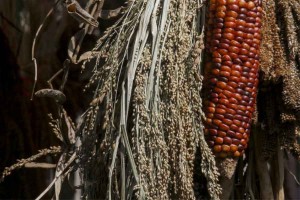WILD FOODS
To celebrate India’s rich and vibrant bio-cultural heritage of tribal foods, indigenous forest people of our oldest surviving tribes from 7 states were present at the 8th CMS VATAVARAN, from 9th – 13th October, 2015 at NDMC Convention center New Delhi as part of the five day environment and wildlife film festival and forum. A unique effort to bring the 25 Adivasi farmers was carried out on a crowd funding online platform to raise funds for their travel from their respective states to New Delhi.
Variety of forest foods were displayed for both exhibition and consumption during all 5 days of the film festival. Bridging the widening gap between the urban and tribal culture, organizations such as Beej Bachao Andolan’ [BBA], Nirman, Abhivyakti Foundation, Vaagdhara etc, brought cultures of tribal communities through their food for Delhi’s public. Alongside the forest foods several tribal crafts from Nagaland and Jharkhand were put as exhibits.
Food items gave invaluable insight into rich culture and life of the diverse tribal communities of India. Natural, safe and nutritious cultivated and uncultivated forest food brought by adivasi and forest dependent communities from all over India were one of the highlights of CMS VATAVARAN 2015.
The food and other items from the representing states are given below-
| State | Tribe/Community | Food / other items |
| Uttarakhand | Farmers |
|
| Madhya Pradesh and Chhattisgarh | Baiga and Pahari Korba |
|
| Jharkhand | Pahariya and Santhals in the Giridih district |
|
| Nagaland |
|
|
| Rajasthan | Bhil |
|
| Odisha | Kondh |
|
| Karnataka |
|
The main aim was to highlight the importance of forest foods and the ethos and worldviews linked to these for a large population of this land. Some of the groups, communities and organizations who were part of the food festival are-
- The ‘Beej Bachao Andolan’ [BBA], is a twenty five year old, non-formal collective of small farmers and activists on conserving and promoting indigenous seeds, agricultural practices and local traditions. The andolan produces over 200 varieties of rajma, conserves traditional rice varieties and work towards revival of Baranaja.
- Nirman, a development organization based out of Mandla in Madhya Pradesh has been working with Baiga and Pahari Korba community on reviving the diversity of the traditional Bewar cultivation and conserving the vanishing land races that are used in Bewar cultivation .
- North East Network is women’s rights organization working in the states of Assam, Meghalaya and Nagaland. NEN has been promoting and addressing a multiplicity of community based interventions related to agro biodiversity since its inception, in 1998.
- Abhivyakti Foundation has been working with Pahariya and Santhals in the Giridih district of Jharkhand on strengthening their local food systems.
- Vaagdhara is a non government organization that works with Bhil communities on strengthening local food system, and revival of traditional agriculture in Rajasthan.
- Living Farms works with Kondh communities in Odisha. The traditional food system of Kondhs reflects their social meanings and ecological realities. They grow more than 50 crops and more than 200 folk varieties of paddy and collect more than 250 foods from forest.
- ‘Poornam’ is a social enterprise started by Meera & Rajesh – IT Consultants by profession. In last 16 years, they have a vast experience in managing and delivering large mission critical IT projects working with global clients. They were exposed to sustainable technologies at Auroville in year 2006. This gave a new direction to their lives and they started ‘Poornam’. ‘Poornam’ aims at encouraging and spreading organic farming in Wayanad. Here, various varieties of traditional organic paddy, turmeric and coffee are grown adopting zero budget natural farming technologies with the local community. They have conserved close to 2000 Western Ghats endemic trees (100 different species) over the past 4 years.



